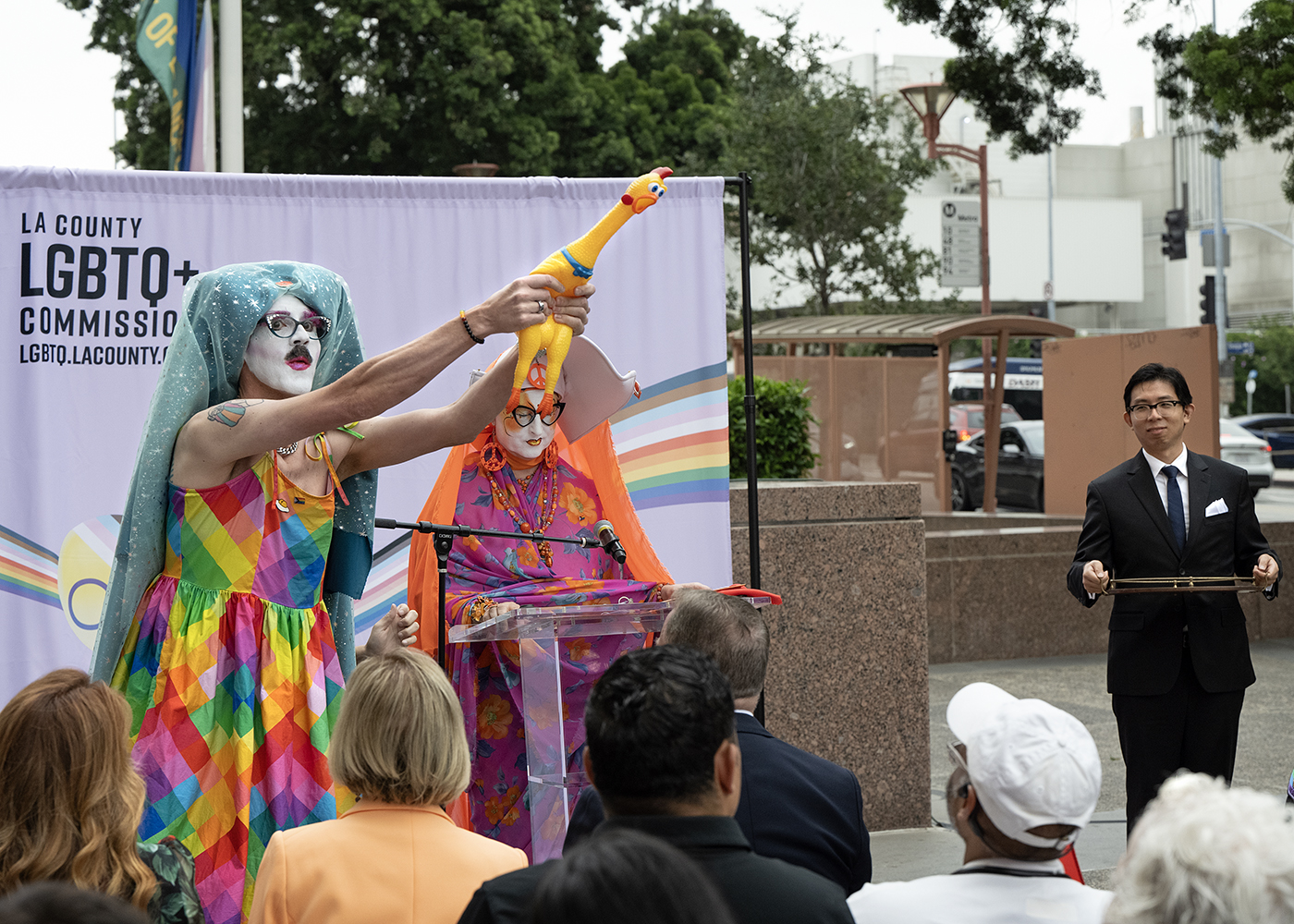Politics
LA County native Leondra Kruger may be nominee for U.S. Supreme Court
If nominated and confirmed, Kruger would be not only the first Black woman on the court, but also the youngest justice


By Amy Howe | WASHINGTON – During a 2020 Democratic presidential primary debate, then-candidate Joe Biden pledged that, if elected, he would nominate a Black woman to serve on the U.S. Supreme Court. With Justice Stephen Breyer expected to retire at the end of this term, California Supreme Court Justice Leondra Kruger is one of the frontrunners to succeed him.
If nominated and confirmed, Kruger – who is just 45 years old – would be not only the first Black woman on the court, but also the youngest justice by over four years and the youngest justice confirmed since Clarence Thomas joined the court in 1991 at age 43. Despite her relative youth, Kruger would bring substantial experience at the high court, with 12 Supreme Court arguments under her belt, as well as a seven-year record on the California Supreme Court that resembles the record of the justice she would replace.
Early life and career
A native of southern California, Kruger is the daughter of two physicians. Her mother hails from Jamaica, while her late father was the son of Jewish immigrants from eastern Europe. Kruger attended the prestigious Polytechnic School, a private prep school in Pasadena, California, whose other alumni include Julia Child and James Ho, a judge on the U.S. Court of Appeals for the 5th Circuit who was on former President Donald Trump’s short list to fill a Supreme Court vacancy.
After graduating from Polytechnic, Kruger compiled the kind of sterling resume the public has come to expect from Supreme Court nominees. She graduated with honors from Harvard University, where she was a reporter for the Harvard Crimson. Kruger covered a wide range of stories, including a hearing on Cambridge’s affirmative-action policy, the 1994 Senate race between the late Sen. Edward Kennedy and Mitt Romney, and a travel guide to her hometown of Pasadena that humorously dismissed East Coast stereotypes about catastrophes in California (“Earthquakes! Fires! Mudslides! Riots!”) as “only jealousy.”
After Harvard, Kruger went to Yale Law School, where she was the editor in chief of the Yale Law Journal – the first Black woman to hold that job. During law school, Kruger spent one summer as an intern for the U.S. attorney in Los Angeles and a second summer as a summer associate at Munger, Tolles & Olson. After graduating from Yale in 2001, she spent a year working as an associate at Jenner & Block in Washington, D.C., before going to clerk for Judge David Tatel of the U.S. Court of Appeals for the District of Columbia Circuit from 2002 to 2003. Kruger went from the D.C. Circuit to the Supreme Court, where she clerked for Justice John Paul Stevens during the 2003-04 term.
When Kruger finished her clerkships, she went into private practice at a third firm, now known as WilmerHale. During her two years there, her clients included Shell Oil, which Kruger represented in an appeal to the U.S. Court of Appeals for the 9th Circuit involving a half-billion-dollar judgment in a Nicaraguan court against Shell and others, as well as Verizon Communications, which Kruger represented in federal district court in California in litigation challenging the participation by telecommunications companies in the government’s domestic-terrorist surveillance program. Kruger left WilmerHale for the University of Chicago Law School, where she taught a class in transnational litigation as a visiting assistant professor.
A stint in the Obama administration, including arguments at the Supreme Court
Kruger returned to Washington in 2007 to take a job as an assistant to the U.S. solicitor general. She served in that role for several years, until she was named the acting principal deputy solicitor general. The lawyer who holds that job, which is sometimes known as the “political deputy,” is normally the only deputy in the solicitor general’s office who is not a career civil servant (and the only other political appointee, beyond the solicitor general, in the office).
During her six years in the solicitor general’s office, Kruger argued 12 cases at the Supreme Court on behalf of the federal government. One of those cases was a high-profile dispute involving whether the “ministerial exception” to employment-discrimination laws – the idea that religious institutions normally have the sole right to determine who can act as their ministers – barred a lawsuit by a teacher and ordained minister who had been fired by the Lutheran school where she worked. Kruger argued that the teacher should be able to pursue her lawsuit against the school for alleged discrimination on the basis of disability. The Supreme Court, in an opinion by Chief Justice John Roberts, unanimously rejected that position and held that the ministerial exception applied.
The other cases Kruger argued touched on a wide range of issues, from the Sixth Amendment’s confrontation clause and right to counsel to federal “career criminal” laws and federal benefits laws. At the lectern, Kruger’s tone with the justices was conversational from the start, with a quiet confidence. She was poised even when she was being peppered with questions from all sides of the bench, as she was in defending an ultimately unsuccessful position in her first argument, in Begay v. United States.
Kruger left the solicitor general’s office in 2013 to serve as a deputy assistant attorney general in another section of the Department of Justice: the Office of Legal Counsel, which (among other things) provides legal advice to the president and other agencies within the executive branch. As Rory Little observed, that office has “yielded an unusual share of prominent federal judges and Justices over the past half century,” including the late Justice Antonin Scalia and the late Chief Justice William Rehnquist.
During her time in the Department of Justice, Kruger twice received the attorney general’s award for exceptional service, the department’s “highest award for employee performance.” Both awards give a glimpse into her work at DOJ beyond the courtroom. In 2013, she was part of a team that won the award for its work in defending the Affordable Care Act, while in 2014 she was a member of a group that won the award for its work implementing the Supreme Court’s 2013 decision in United States v. Windsor, striking down the federal Defense of Marriage Act.
An “out of the box” pick for the California Supreme Court
In 2014, California Governor Jerry Brown nominated Kruger, then just 38 years old, to serve on the California Supreme Court when Associate Justice Joyce Kennard retired. Kruger’s former bosses in the solicitor general’s office praised her selection, with then-Solicitor General Don Verrilli describing her as “brilliant, deeply principled and eloquent” and former Solicitor General Paul Clement calling her an “outstanding lawyer” who “combines an understated and easygoing manner with a keen legal mind and unquestioned integrity.” Former Acting Solicitor General Neal Katyal echoed those thoughts, saying that “California, and the nation, could do no better than Leondra Kruger.”
But despite those accolades from Washington, Kruger’s nomination was not greeted with unbridled enthusiasm within California because Kruger was not a practicing lawyer in the state, was not a judge, and lacked trial experience. However, Kruger was rated “exceptionally well qualified” by the California state bar group responsible for evaluating judicial nominees, and in December 2014 she was confirmed by the Commission on Judicial Appointments, a three-member body that holds a hearing to consider and decide whether to confirm nominees to the state’s highest courts. The commission’s members included Kamala Harris, then the state’s attorney general and now the vice president of the United States. Kruger was sworn into office in January 2015, becoming only the second Black woman to serve on the California Supreme Court.
Lawyers who practice regularly before that court describe Kruger in terms that are not unlike those used to characterize Breyer. In a November 2020 story for The Recorder, appellate lawyer Ben Feuer indicated that Kruger was “not looking to create radical change in the law emanating from the judicial branch.” “Rather,” Feuer continued, she understands the limited yet critical role the judicial branch plays in the complex ballet of our representative democracy.”
In a 2018 interview with the Los Angeles Times, Kruger herself said that she tries to do her job “in a way that enhances the predictability and stability of the law and public confidence and trust in the work of the courts.” Many of the published decisions that Kruger has written or joined while on the California Supreme Court have been unanimous rulings, with largely (although not uniformly) liberal-leaning results.
Upholding rights of the accused, from juvenile court to death-penalty cases
Kruger wrote for a unanimous court in April 2018 in a decision holding that videotaped statements by a three-year-old who claimed that she had been sexually molested by her father should not have been used as the basis to find that the child had been abused, which in turn led to an order for the father’s removal from the family’s home. Kruger acknowledged that juvenile courts have a “sensitive and difficult task” in such cases. However, she continued, the evidence in this case of the child’s reliability was “weaker than the juvenile court acknowledged.” The juvenile court failed to take into account that the child had also recently been molested by an older child, and that “[h]er repeated statements about abuse were strikingly similar to descriptions of that” incident. Moreover, Kruger added, “the child’s account contained both inconsistencies and inaccuracies that were woven through her core allegations.”

Photo: State of California
With automatic appeals to the California Supreme Court, death penalty cases are a staple of the court’s docket. However, California has not executed anyone since 2006, and in 2019 the state’s governor, Gavin Newsom, imposed an official moratorium on executions. In 2019, Kruger wrote for a unanimous court in overturning the death sentence of Jeffrey Scott Young, who was convicted of killing two people during a 2002 robbery and carjacking at an offsite parking lot near San Diego International Airport. The court agreed with Young that the jury should not have been allowed to consider evidence regarding his white supremacist beliefs and tattoos, which prosecutors had introduced during the sentencing phase of his trial to rebut evidence about his good character.
The specific evidence to which prosecutors had been responding, Kruger explained, was testimony from Young’s grandmother about, for example, “his commitment to his family and children.” Although the court did not rule out the possibility that, in a different case, evidence of a defendant’s racist beliefs could be admitted, it cannot be used, Kruger concluded, simply to demonstrate the offensiveness of those beliefs.
Kruger wrote again for a unanimous court in 2020 to throw out another death sentence, this time in the high-profile case of Scott Peterson, who was convicted and sentenced to death for the 2002 murders of his pregnant wife, Laci, and the couple’s unborn child, Conner. Kruger agreed with Peterson that the trial court had made “a series of clear and significant errors in jury selection that, under long-standing U.S. Supreme Court precedent, undermined Peterson’s right to an impartial jury at the penalty phase.” Most notably, Kruger explained, the trial court should not have dismissed potential jurors simply because they expressed general opposition to the death penalty, without also determining whether that opposition would have meant that they would be unable to follow the law and impose the death penalty if warranted. In December 2021, Peterson was resentenced to life in prison without the possibility of parole.
Bodycam footage and sexual-abuse lawsuits
Two years ago, Kruger wrote for the court in its decision holding that a California city could not charge a public-interest group seeking public records for the approximately 40 hours that city employees spent editing footage from police body cameras. A local chapter of the National Lawyers Guild sought records relating to the Hayward Police Department’s actions in the 2014 demonstrations that followed grand jury decisions not to indict the police officers involved in the deaths of Eric Garner and Michael Brown. The city of Hayward billed the group $3,000, citing a state-law provision that requires the person or group requesting electronic records to pay the costs associated with producing copies of those records when producing those copies would require the extraction of data.
The extraction of data, Kruger explained, does not cover redacting exempt material from electronic records that the city would otherwise need to disclose. That interpretation, Kruger reasoned, is more consistent with both the text of the statute and the California legislature’s intent in enacting the law. Moreover, she added, interpreting the term “extraction” to include the costs of redaction “would make it more difficult for the public to access information kept in electronic format” – contrary to the state’s constitution, which “favors an interpretation that avoids erecting such substantial financial barriers to access.”
Kruger acknowledged the city’s argument that “requests for body camera footage present unique concerns for government agencies with limited resources” because of the privacy interests involved, among other things. But this provision does not only cover body-camera footage, Kruger stressed. Instead, she noted, “it covers every type of electronic record, from garden-variety emails to large government databases.” Only the legislature, Kruger indicated, can decide whether to create special rules for body-camera footage.
Last year, Kruger wrote for the court in a unanimous decision holding that three athletes who allege that they were sexually abused by a coach as teenagers can sue USA Taekwondo but not the U.S. Olympic Committee. In her opinion, Kruger rebuffed the plaintiffs’ suggestion that the court should adopt a “more flexible and holistic approach” to determine whether a defendant can be held responsible for failing to protect a victim from harm caused by another person. “Without denying the gravity of the injuries these plaintiffs suffered,” Kruger stressed, “nor the broader problem of sexual abuse of minors in organized youth sports and other activities,” a defendant cannot be held responsible for injuries that it did not cause “unless there are special circumstances” that create a special duty for the defendant to provide protection or help to the plaintiffs.
Other notable decisions Kruger joined
In 2018, Kruger joined a unanimous decision that upheld a state law requiring new handgun models to imprint “micro stamps” inside the guns and on shell casings to make it easier for police to identify them. The National Shooting Sports Foundation, a trade association for gun manufacturers, argued that the requirement should be invalidated because it was impossible to implement the technology. The decision by Justice Goodwin Liu emphasized that the ruling did not involve the constitutionality of the requirement, but instead was simply a question of statutory interpretation. The California Supreme Court’s cases, Liu explained, have acknowledged that statutes may contain an exception when it is impossible to comply with the law when that is what the legislature intended. But in this case, Liu wrote, neither the text nor the purpose of the law indicates that, once the law went into effect, gun manufacturers may be excused from the requirement because it is impossible to comply with it.
Kruger concurred in a 2019 opinion by Chief Justice Tani Cantil-Sakauye that unanimously upheld the death sentence of a man convicted of a brutal double murder and robbery. Cantil-Sakauye’s opinion also rejected the challenge by the inmate, Thomas Potts, to the constitutionality of the state’s death-penalty scheme, as well as his contention that his more than two decades on death row constitutes cruel and unusual punishment.
Kruger did not join a concurring opinion by Liu that, while expressing “tremendous compassion for the victims and their families,” characterized the state’s death-penalty system as “an expensive and dysfunctional system that does not deliver justice or closure in a timely manner, if at all.” It is time, Liu suggested, for a discussion of the death penalty’s “effectiveness and costs.”
Kruger joined a unanimous opinion by Justice Mariano-Florentino Cuellar, another Brown appointee, abolishing the state’s cash bail system. The question came to the court in the case of Kenneth Humphrey, a 66-year-old man charged with robbery. Humphrey’s bail was initially set at $600,000 and then was reduced to $350,000 – an amount that Humphrey still could not pay. Cuellar concluded that the “common practice of conditioning freedom solely on whether an arrestee can afford bail is unconstitutional.” “Other conditions of release,” he continued, including “electronic monitoring, regular check-ins with a pretrial case manager, community housing or shelter, and drug and alcohol treatment,” can often “protect public and victim safety as well as assure the arrestee’s appearance at trial.”
A varied record in divided cases
But not all of the California Supreme Court’s opinions are unanimous. And when the court has divided, Kruger has been difficult to pigeonhole. She has sometimes joined Democratic appointees to reach an arguably “liberal” result, but at other times she has joined Republican appointees to arrive at an arguably “conservative” result.
In the 2016 case Augustus v. ABM Security Services, Kruger declined to join Cuellar’s majority opinion holding that an employer violated state labor laws by requiring its employees – security guards – to keep their radios and pagers on during their rest periods in case they were needed. Cuellar, whose ruling was joined by four other justices, reasoned that the employer’s policies “conflict with an employer’s obligation to provide breaks relieving employees of all work-related duties and employer control.”
In an opinion joined by Justice Carol Corrigan, who was named to the court by Gov. Arnold Schwarzenegger, a Republican, Kruger agreed with the majority that employers “must provide off-duty rest periods” for their employees. But, she continued, simply requiring those employees to carry a radio or a pager during their rest periods isn’t, standing alone, work – particularly when there is no evidence that the security guards’ rest periods were actually interrupted. Kruger would have sent the case back to the lower courts for them to determine whether the company’s “on-call policy actually interfered with its employees’ ability to use their rest periods as periods of rest.”
Kruger provided the key vote in 2018 in Hassell v. Bird, in which the court declined to uphold an order that would have required Yelp to remove negative reviews of a law firm from its site. A three-justice plurality, in an opinion by Cantil-Sakauye, another Schwarzenegger appointee, agreed with Yelp that requiring it to take down the reviews would violate Section 230 of the federal Communications Decency Act of 1996, which generally gives websites immunity for content created by their users. (Corrigan and Justice Ming Chin, who was appointed by Gov. Pete Wilson, a Republican, provided the other two votes for Cantil-Sakauye’s opinion.)
In a separate concurring opinion, Kruger explained that in her view it was “unnecessary to reach” the Section 230 issue. Instead, she would resolve the case on the “more basic” ground that Yelp – which had not been named as a defendant in the case – could not be required to take the review down without “its own day in court.” Kruger agreed that the majority had reached the correct result, but she emphasized that she would not weigh in on how Section 230 might apply more broadly in future cases. She reasoned that although Section 230 “has brought an end to a number of lawsuits seeking remedies for a wide range of civil wrongs accomplished through Internet postings,” “the broad sweep of section 230 remedies also has ‘troubling consequences.’” “Whether to maintain the status quo,” Kruger concluded, “is a question only Congress can decide.”
Joined by Cuellar and two other Brown appointees — Liu and Justice Joshua Groban — Kruger wrote for a 4-3 court in 2019 in throwing out a lower-court ruling that upheld a search of a car without a warrant to look for the driver’s identification. Kruger described the “central issue” before the court as “not whether the search of” the driver’s car was “consistent with the guidance given in” an earlier case, but instead whether to “continue to adhere to” that earlier decision in light of U.S. Supreme Court cases since then.
Noting that the California decision had become an outlier, Kruger observed that although the California Supreme Court’s ruling had “attempted to cordon off” the power it gave to police officers, experience had shown that in practice, the searches have come “perilously close” to full searches of the cars. There are other ways for officers to obtain the information that they need, she suggested, such as asking a driver for her name and date of birth and cross-checking that information against the Department of Motor Vehicles database.
Addressing the dissent’s argument that, without carving out an exception to the Fourth Amendment’s general warrant requirement for cases like this one, “officers may not be able to achieve absolute certainty about the identity of some subset of traffic violators before issuing traffic tickets,” Kruger countered that “the test for whether an exception should be recognized is not whether, in its absence, there might be some cost in effective enforcement of the traffic laws.” Instead, she wrote, it is “whether the tradeoff to lower that risk is worth the coin in diminished privacy.” “It is not,” she concluded, “a price we should lightly require California drivers to pay.”
In 2018, Kruger wrote for a divided court – in an opinion joined by Cantil-Sakauye, Chin, and Corrigan – in rejecting a challenge to a state law that requires law enforcement officials to collect DNA samples and fingerprints from anyone arrested for a felony. Following the U.S. Supreme Court’s 2013 decision in Maryland v. King, the majority concluded that the defendant in the case, Mark Buza, had been arrested for a serious offense – arson – and, at least as applied to him, the requirement therefore did not violate either the U.S. Constitution’s Fourth Amendment or the California constitution.
The majority did not weigh in on whether the law was valid for other defendants, and it rejected a suggestion – made by Liu and Cuellar, in dissenting opinions – that it determine whether the state can require a DNA sample before a judge determines that a defendant’s arrest was valid. Kruger stressed that the court’s holding was “limited,” and she explained that “the law teaches that we should ordinarily focus on the circumstances before us in determining whether the work of a coequal branch of government may stand or must fall.”
Kruger joined an opinion by Liu in 2019 that reinstated a challenge by psychotherapists to a state law that would require them to report to authorities patients who admit to viewing child pornography, even when the therapists don’t believe that the patients pose any harm to children. Writing for a four-justice majority, Liu acknowledged that the “proliferation of child pornography on the Internet is an urgent problem of national and international dimension,” but the court – over a dissent by Cantil-Sakauye, Chin, and Corrigan – concluded that the reporting requirement implicated an interest in privacy. Stressing that the court was not ruling that the reporting requirement was unconstitutional, Liu sent the case back to the lower courts for them to determine whether the reporting requirement actually advances the law’s purpose of protecting children, or whether it instead deters patients from seeking treatment for sexual disorders.
Kruger sided with the court’s conservative justices in a 4-3 ruling in 2017 that made it more difficult for inmates sentenced under the state’s “Three Strikes” law to obtain resentencing. In a separate concurring opinion joined by two of her colleagues, Kruger explained that the other provisions in the ballot initiative on which the inmates seeking resentencing relied reflected a “clear and exclusive focus on affording relief to individuals who have committed specified drug- and theft-related offenses, and neither the stated purposes of the proposition nor the ballot materials alerted voters to any possibility that a favorable vote might also result in a significant change to the separate statutory scheme governing the resentencing of life prisoners under the ‘Three Strikes’ law.” “Although this is certainly a choice the voters could make,” Kruger acknowledged, “I do not think we can say it is a choice the voters have already made.”
Under the California system, although Kruger was nominated by Brown and confirmed by the Commission on Judicial Appointments, she was still required to face the voters in a “retention election,” without an opponent, in 2018. Kruger won retention easily, with nearly 73% of voters – 6.6 million in total – voting “yes.”
Personal life
Kruger is married to Brian Hauck, a partner at the law firm of Jenner & Block and a former senior official in the Department of Justice during the Obama administration. The couple has two children: a son and a daughter.
When she had their daughter in 2016, Kruger became the first California Supreme Court justice to give birth while in office. A 2018 story in the Los Angeles Times recounted how Kruger traveled from the San Francisco Bay area, where she lives, to Los Angeles with her newborn to hear oral arguments; Kruger’s mother-in-law cared for the baby, then four weeks old, while Kruger was working.
If Biden nominates Kruger, it will not be his administration’s first effort to get Kruger to return to the east coast. In January, Marcia Coyle and Ryan Barber of the National Law Journal reported that Kruger had twice turned down offers to serve as the administration’s solicitor general. Like a position as a Supreme Court justice, that job requires Senate confirmation – but a job as a Supreme Court justice comes with life tenure.
*********************

Amy Howe is the former editor and a reporter for SCOTUSblog and still is a contributor. She primarily writes for her eponymous blog, Howe on the Court.
Before turning to full-time blogging, she served as counsel in over two dozen merits cases at the Supreme Court and argued two cases there.
Amy is a graduate of the University of North Carolina at Chapel Hill and holds a master’s degree in Arab Studies and a law degree from Georgetown University.
*********************
The preceding article was previously published by SCOTUSBlog and is republished by permission.
Congress
White House finds Calif. violated Title IX by allowing trans athletes in school sports
Education Department threatens ‘imminent enforcement action’

The Trump-Vance administration announced on Wednesday that California’s Interscholastic Federation and Department of Education violated federal Title IX rules for allowing transgender girls to compete in school sports.
In a press release, the U.S. Department of Education’s Office of Civil Rights threatened “imminent enforcement action” including “referral to the U.S. Department of Justice” and the withholding of federal education funding for the state if the parties do not “agree to change these unlawful practices within 10 days.”
The agency specified that to come into compliance; California must enforce a ban excluding transgender student athletes and reclaim any titles, records, and awards they had won.
Federal investigations of the California Interscholastic Federation and the state’s Department of Education were begun in February and April, respectively. The Justice Department sued Maine in April for allowing trans athletes to compete and refusing a similar proposal to certify compliance within 10 days.
Broadly, the Trump-Vance administration’s position is that girls who are made to compete against trans opponents or alongside trans teammates are unfairly disadvantaged, robbed of opportunities like athletics scholarships, and faced with increased risk of injury — constituting actionable claims of unlawful sex discrimination under Title IX.
This marks a major departure from how the previous administration enforced the law. For example, the Department of Education issued new Title IX guidelines in April 2024 that instructed schools and educational institutions covered by the statute to not enforce categorical bans against trans athletes, instead allowing for limited restrictions on eligibility if necessary to ensure fairness or safety at the high school or college level.
Sports aside, under former President Joe Biden the department’s Office of Civil Rights sought to protect against anti-LGBTQ+ discrimination in education, bringing investigations and enforcement actions in cases where school officials might, for example, require trans students to use restrooms and facilities consistent with their birth sex or fail to respond to peer harassment over their gender identity.
Much of the legal reasoning behind the Biden-Harris administration’s positions extended from the 2020 U.S. Supreme Court case Bostock v. Clayton County, which found that sex-based discrimination includes that which is based on sexual orientation or gender identity under Title VII rules covering employment practices.
A number of high profile Democrats, including California Gov. Gavin Newsom, have recently questioned or challenged the party’s position on transgender athletes, as noted in a statement by Education Secretary Linda McMahon included in Wednesday’s announcement.
“Although Gov. Gavin Newsom admitted months ago it was ‘deeply unfair’ to allow men to compete in women’s sports, both the California Department of Education and the California Interscholastic Federation continued as recently as a few weeks ago to allow men to steal female athletes’ well-deserved accolades and to subject them to the indignity of unfair and unsafe competitions.”
Congress
Garcia elected top Democrat on the House Oversight Committee
Gay Calif. lawmaker vows to hold Trump-Vance administration accountable

U.S. Rep. Robert Garcia (D-Calif.) on Tuesday was elected top Democrat on the House Oversight Committee in a vote that signaled the conference’s overwhelming support for a newer voice on Capitol Hill who will play a key role taking on President Donald Trump.
With a margin of 150-63, the 47-year-old openly gay congressman defeated U.S. Rep. Stephen Lynch (D-Mass.), alongside U.S. Reps. Jasmine Crockett (D-Texas) and Kweisi Mfume (D-Md.) who exited the race after the House Democratic Steering and Policy Committee backed Garcia.
Serving only since 2023, the congressman has had a remarkably quick ascent leading up to his election this week as ranking member of one of the most powerful House committees, awarded a leadership position serving under House Democratic Whip Katherine Clark (Mass.) and selected as a co-chair of former Vice President Kamala Harris’s 2024 presidential campaign.
Democratic members began jockeying for the top seat on the oversight committee this spring after the late-U.S. Rep. Gerry Connolly of Virginia stepped away amid news that his esophageal cancer had returned. He died in May.
Connolly last year fended off a challenge from one of the most well known House Democrats, U.S. Rep. Alexandria Ocasio-Cortez (N.Y.), though with a narrower margin that signaled intra-party tensions over whether leadership roles should still be awarded based on seniority.
Garcia positioned himself as a bridge between the two camps — a consensus candidate with executive managerial experience as the former mayor of Long Beach. At the same time, particularly since the start of Trump’s second term, the congressman has emerged as one of the most outspoken critics of the new Republican regime.
In a statement on X Tuesday, Garcia thanked his colleagues and promised to “hold Donald Trump and his administration accountable.”
I'm honored to have been elected by @HouseDemocrats to serve as Ranking Member on @OversightDems.
— Congressman Robert Garcia (@RepRobertGarcia) June 24, 2025
We will hold Donald Trump and his Administration accountable for their corruption – and work to make our government more effective for the American people.
Let's get to work.
If Democrats win control of the House next year, the oversight committee will be able to exercise powers that are now available only to Republicans under the chair, U.S. Rep. James Comer (R-Ky.), which include the authority to investigate virtually any matter across the federal government, to issue subpoenas, and to compel testimony.
In the meantime, Garcia on Monday promised that Democrats on the committee would “vigorously fight” Republican Speaker Mike Johnson’s (La.) plans “to dismantle the Government Accountability Office.”
Congress
Padilla forcibly removed from federal building for questioning DHS secretary
Prominent Democrats rushed to defend senator

Democratic U.S. Sen. Alex Padilla of California was forcibly removed from a federal building in Los Angeles after attempting to ask questions of U.S. Homeland Security Secretary Kristi Noem during a press conference on immigration Thursday
The city has been rattled in recent days as protestors objecting to the Trump-Vance administration’s immigration crackdowns clashed with law enforcement and then the president deployed National Guard troops and U.S. Marines, which was seen as a dramatic escalation.
According to a video shared by his office, the senator, who serves as ranking member of the Senate Judiciary Immigration Subcommittee, introduced himself and said, I have questions for the secretary.” After he was pushed out of the room, officers with FBI-identifying vests told Padilla to put his hands behind his back and handcuffed him.
“Senator Padilla is currently in Los Angeles exercising his duty to perform Congressional oversight of the federal government’s operations in Los Angeles and across California,” reads a statement from his office.
“He was in the federal building to receive a briefing with General Guillot and was listening to Secretary Noem’s press conference,” the statement continued. “He tried to ask the secretary a question, and was forcibly removed by federal agents, forced to the ground and handcuffed. He is not currently detained, and we are working to get additional information.”
Democrats were furious, with many releasing strong statements online condemning the actions of law enforcement officers, including California Gov. Gavin Newsom (D), Los Angeles Mayor Karen Bass (D), and the state’s other U.S. senator, Adam Schiff (D).
Human Rights Campaign Chief of Staff Jay Brown also issued a statement: “A sitting U.S. senator should be allowed to ask a Cabinet secretary a question at a press conference — in his own state, on an issue affecting his constituents — without being violently thrown to the floor and handcuffed. Everyone who cares about our country must condemn this undemocratic act. Full stop.”
Congress
51 lawmakers sign letter to Rubio about Andry Hernández Romero
U.S. Rep. Robert Garcia (D-Calif.) spoke about gay Venezuelan asylum seeker

Forty nine members of Congress and two U.S. senators, all Democrats, signed a letter Monday to Secretary of State Marco Rubio demanding information about Andry Hernández Romero, a gay Venezuelan national who was deported to El Salvador and imprisoned in the country’s notorious Terrorism Confinement Center, a maximum-security prison known by the Spanish acronym CECOT
“We are deeply concerned about the health and wellbeing of Mr. Hernández Romero, who left Venezuela after experiencing discriminatory treatment because of his sexual orientation and opposition to Venezuela’s authoritarian government,” the lawmakers wrote. They urged the State Department to facilitate his access to legal counsel and take steps to return him.
After passing a credible fear interview and while awaiting a court hearing in March, agents with U.S. Immigration and Customs Enforcement reportedly transported Hernández out of the U.S. without due process or providing evidence that he had committed any crime.
In the months since, pressure has been mounting. This past WorldPride weekend in Washington was kicked off with a rally in front of the U.S. Supreme Court and a fundraiser, both supporting Hernández and attended by high profile figures including members of Congress, like U.S. Rep. Mark Takano (D-Calif.)
U.S. Rep. Robert Garcia (D-Calif.) was among the four members who wrote to Rubio about Hernández in April. On Friday, he spoke with the Los Angeles Blade before he and his colleagues, many more of them this time, sent the second letter to Rubio.
“There’s a lot of obviously horrible things that are happening with the asylum process and visas and international students and just the whole of our value system as it relates to immigration,” he said, which “obviously, is under attack.”
“Andry’s case, I think, is very unique and different,” the congressman continued. “There is, right now, public support that is building. I think he has captured people’s attention. And it’s growing — this is a movement that is not slowing down. He’s going to be a focal point for Pride this year. I mean, I think people around the world are interested in the story.”
Garcia said he hopes the momentum will translate to progress on requests for proof of life, adding that he was optimistic after meeting with Hernández’s legal team earlier on Friday.
“I mean, the president, Kristi Noem, Marco Rubio — any of these folks could could ask to see if just he’s alive,” the congressman said, referring to the secretary of Homeland Security, whom he grilled during a hearing last month. ICE is housed under the DHS.
“People need to remember, the most important part of this that people need to remember, this isn’t just an immigration issue,” Garcia noted. “This is a due process issue. This is an asylum case. We gave him this appointment. The United States government told him to come to his appointment, and then we sent him to another country, not his own, and locked him up with no due process. That’s the issue.”
Garcia said that so far neither he nor his colleagues nor Hernández’s legal team were able to get “any answers from the administration, which is why we’re continuing to advocate, which is why we’re continuing to reach out to Secretary Rubio.”
“A lot more Democrats are now engaged on this issue,” he said. U.S. Sens. Adam Schiff and Alex Padilla, both from California, joined Monday’s letter. “The more that we can get folks to understand how critical this is, the better. The momentum matters here. And I think Pride does provide an opportunity to share his story.”
Asked what the next steps might be, Garcia said “we’re letting his legal team really take the lead on strategy,” noting that Hernández’s attorneys have “already engaged with the ACLU” and adding, “It’s very possible that the Supreme Court could take this on.”
In the meantime, the congressman said “part of our job is to make sure that that people don’t forget Andry and that there is awareness about him, and I think there’s a responsibility, particularly during WorldPride, and during Pride, all throughout the month — like, this is a story that people should know. People should know his name and and people should be aware of what’s going on.”
Breaking News
Controversy brews in the City of Glendale over support of Pride event
Republican Mayor Ara Najarian pushes back on funding family-friendly Pride event

Over the last three weeks, glendaleOUT — a local LGBTQ group based in Glendale, California and city leadership have been at odds over securing financial support of a family-friendly Pride event set to happen on Saturday, June 7. As of Tuesday, Glendale’s city council voted 3-2 in favor of funding the event, ending a weeks-long argument over securing the funds.
The controversy began when the group highlighted how neighboring cities have visibly demonstrated support for Pride Month celebrations across the county, while the City of Glendale has yet to sponsor events with banners, city logos and financial sponsorship.
Councilmember Dan Brotman proposed $5,000 in sponsorship funds, noting that the city has funded other cultural events with much larger amounts.
Local leaders, but specifically Mayor Ara Najarian — who was just re-elected for a fifth term — are pushing back and opposing the proposal for funding. According to sources, Mayor Najarian openly opposed the proposal, stating a distant conflict of interest as the reason for the opposition.
LGBTQ advocates have been quoted as saying this is a “bad-faith political tactic, not grounded in any real conflict of interest.”
The next potential vote is expected to happen today at a city council meeting. Organizers say that the Pride event will happen regardless, but that they still hope to shed light on the patterns of sexual orientation-based discrimination in the city council.
For more information about the free community Pride event, visit glendaleOUT’s website.
California
LA County officially kicks off Pride Month with blessing from The Sisters of Perpetual Indulgence
‘This needs to be done, because once again, our county and our nation houses people who want us gone, who wish us harm’

The LA County Board of Supervisors and the LA County LGBTQ+ Committee gathered on Tuesday, June 3, to officially kick off Pride Month across the county with a blessing from The Sisters of Perpetual Indulgence, who purified the space with their sacred chicken, then led everyone in blessing the Progress Pride flag before raising it at the Kenneth Hall of Administration.
“By raising this flag, the emblem of our souls and of our souls, of our love, of our survival, and of the gifts we offer to every Angeleno in this county — you all declare and you declare to everyone both here and abroad, that we are your people and you affirm that this is our home too,” said Sister Unity. “This needs to be done, because once again, our county and our nation houses people who want us gone, who wish us harm.”

LA County Supervisors and other community leaders gathered on Tuesday at the Kenneth Hall of Administration to raise the Progress Pride flag in honor of Pride Month. (Photo credit to Diandra Jay)
Supervisors Janice Hanh, Holly J. Mitchell, Lindsey P. Hovarth and Hilda L. Solis spoke on the importance of representation in the face of discrimination, homophobia and transphobia.
Supervisor Hahn mentioned in her speech that her father, Kenneth Frederick Hahn designed the LA County flag and it was clear to her that he believed that a flag was more than just a piece of fabric.
“My dad, the original Supervisor Hanh, designed the LA County flag and he understood that a flag is not just fabric. A flag is a symbol. It’s a visual representation of who we are, what we value and what we stand for.”
Two years ago, Supervisor Hahn started the tradition to raise the flag alongside the one her father designed and then it was Supervisor Horvath who suggested that the Pride flag be flown on all county facilities across Los Angeles.
“Now, in every corner of our vast county — from our lifeguard stations on our beaches, to every library, fire station — and may I add: all eight county buildings in the city of Downey. Wherever there is a county facility, the Progress Pride flag will send a clear, powerful message to our LGBTQ residents: ‘your county government unequivocally and unapologetically has your back.’”
The comment about the city of Downey is in regards to a controversial Pride flag ban that was enacted last year.
Supervisor Hahn then introduced LA County Assessor Jeff Prang, one of the longest-serving, out, elected officials in the state of California. Due to his long history in government and as a member of the LGBTQ community, Assessor Prang helped launch the LA County LGBTQ Elected Officials Association with over 50 active members from all levels of government.
“We are in a moment of crisis in the nation. Across the country, an extremist movement is working to dismantle LGBTQ rights — from banning books to criminalizing gender-affirming care, to silencing drag performers, to targeting our youth and families with cruelty disguised as policy,” said Assessor Prang. “These are not isolated incidents, this is a campaign of fear and repression.”
Héctor Trinidad-Plascencia, the Chair of LGBTQ+ Commission, encouraged attendees who are not from the queer and trans communities, to remove the blockages that keep them from being in solidarity with queer and trans people.
“With your solidarity, we are creating a different world together starting in our county home and for the nation to follow,” they said.
White House
DOJ launches investigation into Calif. trans student-athlete policy
State AG vows to defend Golden State laws

One day after President Donald Trump threatened to strip California of “large scale federal funding” over its policy on transgender student-athletes, his Justice Department announced it is investigating the state for potentially violating Title IX.
“The investigation is to determine whether California, its senior legal, educational, and athletic organizations, and the school district are engaging in a pattern or practice of discrimination on the basis of sex,” the DOJ said in a statement.
The DOJ said it notified State Attorney General Rob Bonta, State Superintendent of Public Instruction Tony Thurmond, the Jurupa Unified School District, and the California Interscholastic Federation of its investigation.
AB Hernandez, 16, is an out trans female student-athlete at Jurupa Valley High School who qualified for this weekend’s state track and field championship. As the Los Angeles Blade reported earlier this week, the CIF announced a change in the rules at the finals to accommodate girls who were displaced by Hernandez, including giving medals to cisgender competitors who earn a podium spot should Hernandez place ahead of them.
“We remain committed to defending and upholding California laws and all additional laws which ensure the rights of students, including transgender students, to be free from discrimination and harassment,” said Bonta in a statement. “We will continue to closely monitor the Trump administration’s actions in this space.”
As KTLA reported, California is one of 22 states that allow trans student-athletes to participate in sports consistent with their gender identity. Former Gov. Jerry Brown signed that policy into law in 2013.
The DOJ announced it is also now supporting a federal lawsuit targeting Bonta and the state Department of Education, claiming that California law and CIF policy discriminate against cisgender girls by allowing trans female athletes to compete according to their gender identity.
The lawsuit was filed by a conservative law group, Advocates for Faith and Freedom, representing the families of two girls at Martin Luther King High School in Riverside. Their suit claims the school’s cross-country team dropped one athlete from her varsity spot in favor of a trans athlete and that school administrators compared their “Save Girls Sports” T-shirts to swastikas.
Officials in Washington also weighed-in, referring to trans girls and women as “males.”
“Title IX exists to protect women and girls in education,” said Assistant U.S. Attorney General for Civil Rights Harmeet K. Dhillon. “It is perverse to allow males to compete against girls, invade their private spaces, and take their trophies.”
“The law is clear: Discrimination on the basis of sex is illegal and immoral,” said U.S. Attorney Bill Essayli. “My office and the rest of the Department of Justice will work tirelessly to protect girls’ sports and stop anyone — public officials included — from violating women’s civil rights.”
According to Gov. Gavin Newsom’s office, out of the 5.8 million students in California’s K-12 public school system, the number of active trans student-athletes is estimated to be in the single digits.
Congress
Garcia confronts Noem over gay asylum seeker ‘forcibly removed’ to El Salvador
Andry Hernández Romero is makeup artist from Venezuela

California Congressman Robert Garcia on Wednesday asked Homeland Security Secretary Kristi Noem about the well-being of a gay asylum seeker from Venezuela who the U.S. “forcibly removed” to El Salvador.
The gay Democrat during a House Homeland Security Committee hearing asked Noem whether Andry Hernández Romero is “alive” and whether “we can check and do a wellness check on him.”
“This individual is in El Salvador, and the appeal would be best made to the president and to the government of El Salvador,” Noem told Garcia.
The Trump-Vance administration in March “forcibly removed” Hernández, who asked for asylum because of persecution he suffered due to his sexual orientation and political beliefs, and other Venezuelans from the U.S. and sent them to El Salvador.
The White House on Feb. 20 designated Tren de Aragua, a Venezuelan gang, as an “international terrorist organization.” President Donald Trump on March 15 invoked the Alien Enemies Act of 1798, which the Associated Press notes allows the U.S. to deport “noncitizens without any legal recourse.”
Alvaro M. Huerta, director of litigation and advocacy for the Immigrant Defenders Law Center, a Los Angeles-based organization that represents Hernández, said officials with U.S. Immigration and Customs Enforcement and U.S. Customs and Border Protection claimed their client is a Tren de Aragua member because of his tattoos.
The Washington Blade on April 17 reported Hernández was sent to El Salvador’s Terrorism Confinement Center, a maximum-security prison known by the Spanish acronym CECOT.
Garcia, along with U.S. Reps. Maxwell Alejandro Frost (D-Fla.), Maxine Dexter (D-Ore.), and Yassamin Ansari (D-Ariz.) last month met with U.S. Ambassador to El Salvador William Duncan and embassy staffers in San Salvador, the Salvadoran capital. The lawmakers did not visit CECOT, but Garcia told the Blade that the embassy agreed to ask the Salvadoran government to “see how (Hernández) is doing and to make sure he’s alive.”
California Politics
Zbur continues fight for LGBTQ rights amid Trump attacks
He continues to cement a pro-equality legacy in state legislature

Assemblymember Rick Chavez Zbur (D-51), 68, grew up in a rural farming community
surrounded by animals and land in Rio Grande Valley, New Mexico — ultimately becoming the first person in his rural community to attend an Ivy League university.
Since then, he has continued to build his reputation as an advocate and as a
political leader in environmental justice and LGBTQ rights.
Most recently, Zbur introduced Assembly Bill 309, which would support
California’s strategy to prevent the spread of HIV and viral hepatitis by preserving existing laws that increase access to sterile syringes at no added cost to the state.
“Extensive research and data collection has repeatedly proven that increased access to sterile syringes significantly lowers rates of transmission and saves lives
without increasing rates of drug use,” said Zbur when presenting AB 309.
He added that the average estimated cost for lifetime medical costs related to HIV treatment for one person is $326,500. “Syringe access not only saves lives, but it also saves individuals and the state from the steep cost of treatment,” he continued.
As a gay man in the peak of the AIDS crisis, Zbur saw some of his own close friends become ill, motivating him to become an AIDS activist at a time when the federal government was failing to provide resources to the community that needed them the most.
“Since I’ve been in the Assembly, I’ve always had a number of bills every year that focus on uplifting the LGBTQ community, as well as getting to zero, in terms of HIV — zero transmissions, zero deaths, zero stigma.”
Prior to this bill and a few others, Zbur also introduced AB 5, which he says was a culmination of eight years worth of work, from the time he started working for Equality California (EQCA), the state’s largest nonprofit organization dedicated toward advocating for LGBTQ civil rights.
AB 5, which was passed and is now known as the Safe and Supportive Schools
Act, is meant to improve the conditions for LGBTQ students in schools.
“I think this bill has the most impact for LGBTQ youth and it’s the one I’m proudest of because it requires that every teacher in California schools has LGBTQ cultural competency training, to make sure that our schools are safe and supportive.” Zbur, a longtime advocate for the LGBTQ community, has a long history of activism.
In the early 1980s, Zbur campaigned for the fight against HIV/AIDS, helped found the Children Affected by AIDS Foundation and alongside the Los Angeles LGBT Center, organized fundraisers for Bill Clinton while he was governor of Arkansas, and Barbara Boxer, who was then running for U.S. Senate.
“I think part of me coming out more publicly was due to the HIV epidemic and
the fact that I had friends that were getting sick,” he said. “I had a long-term boyfriend
back then and we started to get politically active, really trying to make sure that the
government was doing something about the HIV epidemic.”
He says that this is when he decided he was going to get Barbara Boxer elected, because she was the only Senate candidate during that time who was even mentioning the LGBTQ community.
In 1996, Zbur ran for the United States House of Representatives in California’s 38th congressional district against Republican incumbent Steve Horn. He became the first openly gay non-incumbent congressional primary candidate to win an election when he won the Democratic primary election on March 26, 1996.
During many years following that win, Zbur jumped into another pool of justice
fighting for environmental issues and then in 2014, joined Equality California as
executive director. Under his leadership, EQCA quadrupled in size, passed groundbreaking legislation to advance LGBTQ equality measures and sued the Trump-Pence administration twice, blocking attacks against the transgender community of California.
In 2022, Zbur was elected to the California State Assembly to represent the 51st
Assembly District, a position he currently serves. He was appointed in July 2023 by
Assembly Speaker Robert Rivas to serve as the Democratic Caucus Chair of the California Assembly, one of the Speaker’s key leadership positions. During that time, he also led the advancement in civil rights and social justice for the many other marginalized communities within the LGBTQ umbrella, such as communities of color, communities of faith, immigrants women and people living with HIV.
Zbur says that his work is never over.
“We’re facing greater risks that are greater than I think we’ve faced in recent
years coming out of the [first] Trump administration. The targeting of transgender and
gender non-conforming people is an even greater part of his hostility toward our
community,” he said. “It’s very real, and we see that it’s not just rhetoric. He’s taking real
steps to try to shut down the healthcare that LGBTQ people and transgender people
need.”
Zbur says that he and the other members of the LGBTQ Caucus in Sacramento
are constantly thinking of those decisions and their repercussions.
“I have another bill that is focused on helping transgender people get the
government documents they need, so they can protect themselves from the Trump
administration and so that they can travel easily to get medical care.”
Zbur says that his own coming out story was positive, but he grew up in a time
where he did not know anyone who was out about their identity. He went through many
trials and tribulations to end up in a space where he was finally accepted.
“For me, coming to terms with the fact that I was LGBTQ, was something that
took a number of years,” said Zbur. “The world was just a very different place back then
and the risks were high, coming out.”
When he started his career as a lawyer, he became a partner in a law firm called
Latham and Walkins, where there was not a single person who was out.
“I eventually came out when I was a fourth or fifth year associate and I became
the first out lawyer in the firm’s history, though there were other gay lawyers at the firm.”
Now, at 68, Zbur says that his only regret is that he lived in the closet for too long.
“When I look back at the things I regret, it’s that I lived in the closet for as long as
I did,” he said. “That is a very limiting thing that I think doesn’t allow your soul or your
spirit to flourish.”
California Politics
Governor Newsom supports bill to put LGBTQ helpline number on student ID’s
AB 727 would put the number for The Trevor Project on the back of students ID cards

Gov. Gavin Newsom expressed support for LGBTQ suicide hotline measures for K-12 students in direct response to recent reports that Secretary of Health and Human Services Robert F. Kennedy Jr’s., plans to cut funding for the national nonprofit that provides the resource to LGBTQ people.
“Cutting off kids’ access to help is indefensible. While the Trump administration walks away from its responsibility, California will continue to expand access to life-saving resources, because the life of every child — straight, gay, trans — is worth fighting for,” said Gov. Newsom.
Assembly Bill 727, introduced by Assemblymember Mark González, would aim to facilitate pupil and student safety by requiring schools and institutions to have the telephone number and text line for a specified LGBTQ suicide hotline provided by The Trevor Project, that is available 24 hours per day, 7 days per week.
Existing law that will be enforced July 1, 2025, requires a public or private school that serves pupils in any of grades 7 to 12, inclusive, and that issues pupil identification cards to have printed on the identification cards the number for the 988 Suicide and Crisis Lifeline.
This bill would additionally require the list of K-12 public schools and institutions to provide support to youth and their families who have been subjected to school-based discrimination, harassment, intimidation or bullying on the basis of gender identity, sexual orientation or gender expression.
Conservative organizations like the California Family Council are pushing back on this bill, stating that this bill is “forcing LGBTQ advocacy on every student ID — no exemptions for religious schools,” and saying it “undermines families.”
A national 2024 survey by The Trevor Project on mental health of LGBTQ young people, reports that 1 in 10 young LGBTQ-indetifying people in the United States attempted suicide in 2023. Over a third of LGBTQ young people seriously considered suicide within the past year and that figure was even higher for trans and nonbinary-identifying youth, with that figure being 46%.
The survey also found that half of LGBTQ youth who wanted mental health resources and care could not get them. Over 50% of survey respondents answered “a lot” when asked about how often recent politics negatively impact their well-being.
The Trevor Project is one of the nonprofit organizations that is currently at high-risk for losing their funding under Trump’s budget cuts.
The phone number to call for help is 1-866-488-7386 and the number to text for help is 678-678, or you can send them a message at the site link.
-

 News2 days ago
News2 days agoWest Hollywood to advance protections for diverse and non-nuclear families
-

 Commentary4 days ago
Commentary4 days agoThe Supreme Court’s ‘Don’t Read Gay’ ruling
-

 Arts & Entertainment3 days ago
Arts & Entertainment3 days ago2025 Emmy nominations: ‘Hacks’ and ‘The Last of Us’ bring queer excellence to the table
-

 a&e features4 days ago
a&e features4 days agoThe art of controlled chaos: Patrick Bristow brings the Puppets to life
-

 Movies3 days ago
Movies3 days ago‘Superman’ is here to to save us, despite MAGA backlash
-

 Sports3 days ago
Sports3 days agoHololive and Dodgers create a home for queer fandom
-

 Events2 days ago
Events2 days agoLos Angeles Blade to take special part in NLGJA Los Angeles inaugural journalism awards
-

 Features8 hours ago
Features8 hours agoTS Madison Starter House offers a blueprint for Black, trans liberation



